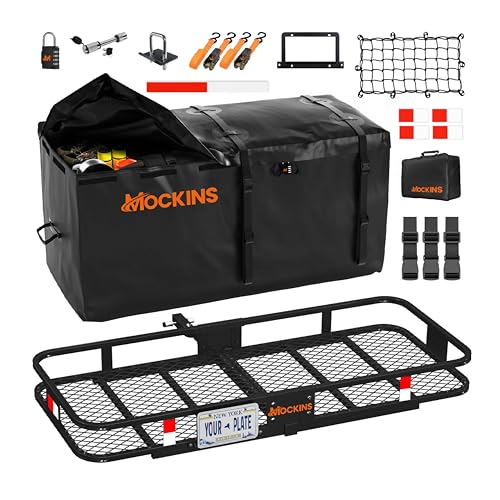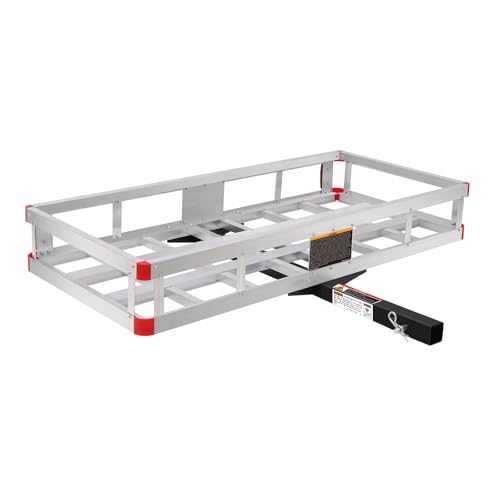Let’s be real – sometimes your trunk just isn’t big enough. Whether you’re headed on a road trip, moving some bulky gear, or just need a little extra space for your next outdoor adventure, a hitch cargo carrier can be a total game-changer. If you’ve ever played a frustrating game of car-Tetris trying to fit everything into your vehicle, you already know the struggle.
I’ve gone deep into the world of hitch cargo carriers, sifted through the good, the bad, and the ‘why does this even exist?’ to bring you the best options out there. So buckle up (pun intended), and let’s find you the perfect one.
Top Pick Overall
Why it’s great: This is the workhorse of hitch cargo carriers. It’s built like a tank and ready to handle just about anything you throw on it. The high sides help keep gear from slipping off, and it folds up neatly when not in use—perfect for those who don’t want a bulky attachment hanging off their vehicle all the time.
Will It Even Fit? Understanding Hitch Compatibility
Here’s the deal: Not all hitch cargo carriers will fit your car. Check your hitch class before you start shopping.
- Class I (small sedans): Can hold up to 2,000 lbs—great for lightweight carriers but not much more.
- Class II (larger sedans, small SUVs): Up to 3,500 lbs, so you’ve got a little more wiggle room.
- Class III (SUVs, trucks, vans): Supports up to 6,000 lbs and is the most common hitch type for cargo carriers.
- Class IV & V (heavy-duty trucks): Built for serious hauling—probably overkill for a cargo carrier unless you’re bringing a small house with you.
Most hitch cargo carriers require a 2-inch receiver. If your car only has a 1.25-inch receiver, you’ll need an adapter (or a different carrier).
Weight Limits: Don’t Overload Your Ride
Just because a hitch carrier can hold 500 pounds doesn’t mean your car can handle it. Check your vehicle’s tongue weight capacity—that’s the max downward force your hitch can handle.
Also, don’t forget to factor in the weight of the carrier itself! A heavy-duty steel carrier could weigh 60 lbs or more, so if your limit is 300 lbs, that leaves only 240 lbs for cargo.
Why You Need a Hitch Cargo Carrier
If you’re still on the fence about getting a hitch cargo carrier, let’s talk about why they’re such a fantastic addition to your vehicle. The benefits go far beyond just having more room for your gear. Here’s to mention just a few:
- Free Up Interior Space
- Keep Your Vehicle Cleaner
- Perfect for Road Trips & Adventures
- Carry Oversized or Awkward Items
- Less Wind Resistance Compared to Roof Racks
- Better Accessibility
The Best Hitch Cargo Carriers You Can Buy
Best Overall Hitch Cargo Carrier
Why it’s great: This is the workhorse of hitch cargo carriers. It’s built like a tank and ready to handle just about anything you throw on it. The high sides help keep gear from slipping off, and it folds up neatly when not in use—perfect for those who don’t want a bulky attachment hanging off their vehicle all the time.
Best for Weather Protection
Why it’s great: If you ever got caught in a downpour with your gear strapped to a cargo carrier, you know the struggle. This one comes with a waterproof bag to keep your stuff dry, plus a bungee net for extra security. Whether you’re hauling camping gear or road trip essentials, this setup ensures everything stays in place no matter the weather.
Best Lightweight Option
Why it’s great: If you want something strong but without the back-breaking weight of steel, this aluminum model is a solid pick. It’s rust-resistant, so you don’t have to worry about it deteriorating over time. Plus, the open-floor design keeps it from collecting dirt and grime, making maintenance a breeze.
Best for High Walls
Why it’s great: If you’re the type who likes to load up your carrier without worrying about things shifting, this is a great choice. The 14.4-inch side rails create a barrier that keeps everything where it should be. The mesh floor also makes cleanup easy—just hose it down when you’re done. Simple, sturdy, and reliable.
Best for Versatility
Why it’s great: This is a rugged 2-in-1 solution for hauling gear and bikes. It securely holds up to four bikes while providing extra cargo space. Its heavy-duty steel build, mesh platform, and adjustable tie-down points ensure stability and easy cleanup. Perfect for road trips, camping, or outdoor adventures.
Best Budget Option
Why it’s great: This is an affordable and reliable option. It features a simple steel frame with a mesh base, making it easy to clean and lightweight enough for easy installation. While it doesn’t come with all the bells and whistles of pricier models, it gets the job done for anyone who just needs a straightforward, cost-effective cargo solution.
Best Budget Option
Why it’s great: This is an affordable and reliable option. It features a simple steel frame with a mesh base, making it easy to clean and lightweight enough for easy installation. While it doesn’t come with all the bells and whistles of pricier models, it gets the job done for anyone who just needs a straightforward, cost-effective cargo solution.
What to Look for in a Hitch Cargo Carrier
Not all cargo carriers are created equal, and picking the wrong one can quickly turn your convenience upgrade into a frustration. So, what makes a great hitch cargo carrier?
Weight Capacity, Size, and Material
First, consider weight capacity. Your vehicle and hitch receiver both have limits, and overloading your carrier can lead to handling issues or, worse, damage to your car. Most standard carriers can hold between 300 to 600 pounds, but always double-check your vehicle’s specs before you go all-in.
Size matters too. If you’re carrying bulky gear like camping equipment, coolers, or suitcases, you’ll want a wide enough platform to fit everything securely. Common dimensions range from around 48 to 60 inches in width and roughly 20 inches in depth. The last thing you want is to get everything packed and realize your largest item sticks out past the frame.
Then there’s material. Steel is tough and long-lasting, but it’s also heavier. Aluminum, on the other hand, is lighter and rust-resistant but may not handle quite as much wear and tear over time. If you’ll be driving in harsh weather or plan on keeping the carrier attached year-round, opting for something with a powder-coated finish can help prevent corrosion and rust.
Fixed or Folding: Which Is Right for You?
Hitch cargo carriers come in two main styles—fixed and folding. A fixed carrier stays extended behind your vehicle at all times, which is fine if you’re using it frequently or don’t mind the extra length when parking. But if you want something a little more adaptable, a folding model is a solid choice. When it’s not in use, you can flip it up against the back of your car, making it less of a hassle when navigating tight parking spots or city streets.
Then there’s the decision between a basket-style carrier versus a flat platform. The raised edges on basket models help keep loose or oddly-shaped items contained, which is a big plus if you’re hauling camping gear or anything prone to shifting. Flat platforms, while great for bigger and heavier objects, require extra tie-downs to ensure nothing slides off mid-drive. If you’re planning on securing items like generators or heavy toolboxes, a flat platform might be the better bet, but for more general hauling needs, a basket-style carrier adds an extra layer of security.
Keeping Your Cargo Secure and Legal
Speaking of security, there are a few must-have accessories to make sure your gear stays exactly where you left it. Ratchet straps or bungee cords are a necessity for keeping everything tight and locked down, especially when traveling at highway speeds. If your carrier doesn’t come with reflectors, adding some is a smart move to increase visibility for drivers behind you, especially at night.
And here’s something a lot of people overlook—your license plate. Depending on the size and placement of your cargo carrier, it might obscure your plate, which could get you pulled over in some states. To avoid any unwanted stops, you might need a relocation bracket or an external plate mount with lighting to ensure everything stays road-legal.
Drive Smart with Extra Cargo in Tow
Driving with a hitch cargo carrier isn’t quite the same as driving without one, and if you’re not careful, it can take some getting used to. Since the carrier extends your vehicle’s length, reversing can be tricky if you’re not accustomed to the extra clearance. Even small things, like backing into parking spaces or navigating drive-through lanes, require a bit more awareness.
Road conditions also play a big role. Going over potholes or speed bumps can be rougher than you expect, especially if your carrier is loaded up with heavy gear. Every bump and dip in the road sends vibrations through the cargo, so making sure everything is strapped down securely before you start driving is crucial. If you want to cut down on the dreaded rattle and sway, consider investing in a hitch tightener—it helps eliminate that annoying movement and makes for a smoother ride.
Final Thoughts
A hitch cargo carrier is one of the best investments you can make for road trips, moving large items, or simply giving yourself more storage space without overstuffing your vehicle. With so many options on the market, finding the right one depends on your specific needs—whether that’s a lightweight aluminum design, a high-capacity steel model, or one with built-in weatherproofing.
No matter which option you choose, always ensure that your carrier is properly installed, your cargo is securely tied down, and your vehicle’s weight limits aren’t exceeded. A well-chosen hitch cargo carrier will make your travels easier, safer, and far more enjoyable.
Frequently Asked Questions
Update History:
- 14/07/2023 – Updated product lists and supplementary content to improve user experience and overall helpfulness.
Willem is an avid mountain biker and outdoor sports enthusiast. For years, he has been riding mountain bike stage races, including the grueling Cape Epic. As a father of three adventurous kids, he knows about packing a vehicle to haul his gear safely and responsibly from home to any exciting weekend or holiday destination.






I need a cargo carrie for the back of my rv. Rv has 2″ receiver hitch. The depth of the carrier needs to be 28″ or more to fit a champion 7500 watt dual fuel generator. I also need to carry 2 mountain bikes. The generator’s weight is 205 lbs. If I could get a cargo rack with it’s owner receiver hitch, I could put a standard bike rack on it. Otherwise, I would need a very high mount so the bikes would ride over the generator which is around 29″ in height. Do you have a solution for me 🙂 Darrel
I searched for days for a cargo carrier that included a receiver at the back end. I wanted to add a bicycle rack after the cargo carrier or plugin some steps for our truck camper. Finally, I found B-DAWG cargo carriers. Why don’t cc manufacturers offer this? Also, having to add plywood to protect the mesh bottoms is just another modification that manufacturers should resolve. All in all, I was not happy with the quality of cc on today’s market…
What brand is the cargo hitch rack and bag on the picture of the article ?
Cody – that’s a “Lets Go Aero” cargo bag on their own carrier. It will fit a bunch of other carrier brands as well.